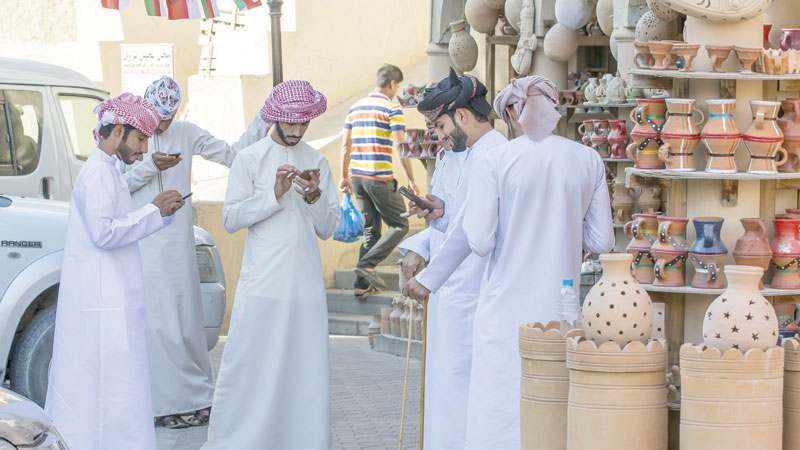

Muscat, April 8 -
An academic research shows children and young adults are being exposed to significant risks on social media from the amount of damaging information available online.
A study carried out by senior management students of Modern College for Business and Science (MCBS) indicates nearly 70 per cent of Omani youth between the age of 15 and 25 years are on social media up to 15 hours a day.
The research, conducted by Manal al Hadhrami and Munal al Maawali on a cross-sectional basis, underlines the core problem of many young people addicted to the social media.
“It was a simple academic research but very significant in its findings. It has revealed what we already know, that a lot of youth find it hard to live without the social media,” 22-year-old Manal al Hadhrami, told
the Observer.
The same sentiment was shared by her colleague who put emphasis on addiction and lack of discipline among young people around her age.
“Unfortunately, many students around my age fail to concentrate on their studies. It is shocking to find out a big number among them spend up to 15 hours a day on social media. It leaves them with only nine hours of sleep, meals, studies, family gatherings and friends.
“It simply means they are very addicted to it and that is very unhealthy,” 22-year-old Muna al Maawali, said.
Omani parents are also concerned about social media “pollution” on the minds of their children saying the online trend is taking most of their time.
“I see very little of my 15-year-old daughter. She locks herself in her bedroom with her mobile phone for hours. She is also online until 2 in the morning. It is frightening to think what she is reading or who she is communicating with,” Muhammed al Junaibi, an employee of the Ministry of Civil Service, said.
Other parents voice their concerns on the anti-social trends of their children and the impact it would have on their future.
“I have three children between the age of 10 and 17 years. They are all hooked to social media. They spend hours staring at the small screens of their phones. They don’t talk to each other or their parents. They don’t even want to go out with their families.
“They even take their meals in their rooms. In other words, they socialise very little and I am sure this undesirable habit will have a negative impact on their future,” Khalfan al Suleimani, an Information Technology business entrepreneur, said.
The Modern College study revealed that the number one social media application favoured by Omani youth is Instagram followed by WhatsApp and Snapchat.
Psychologists say excessive exposure to social media leads to anxiety and a complete cut-off from reality.
“For example, from the age of 12, children lose connection from the real world. They are increasingly becoming conscious about their image on social media. They desperately want their friends to ‘like’ what they post on the Instagram or to see comments.
“On Snapchat, they want to see who viewed their videos and photos. On WhatsApp, they look for the blue double ticks and quick but positive answers. If they don’t get that, they try again and again until they get depressed. If they get all that, they want more and that’s how they get addicted,” Sharifa al Qarni, a psychologist and counsellor, said.
Other experts say the youth use social media to get sympathy or win social validation.
“This undermines views of themselves when they need the approval of their peers. It results in loss of confidence and even their identities. It makes them emotionally unstable and vulnerable to negative influences.
“They later become completely cut-off from reality and lose the sense of what is right and wrong,” Khadija al Khaili, a social therapist specialising in young adults, said.
Oman Observer is now on the WhatsApp channel. Click here



